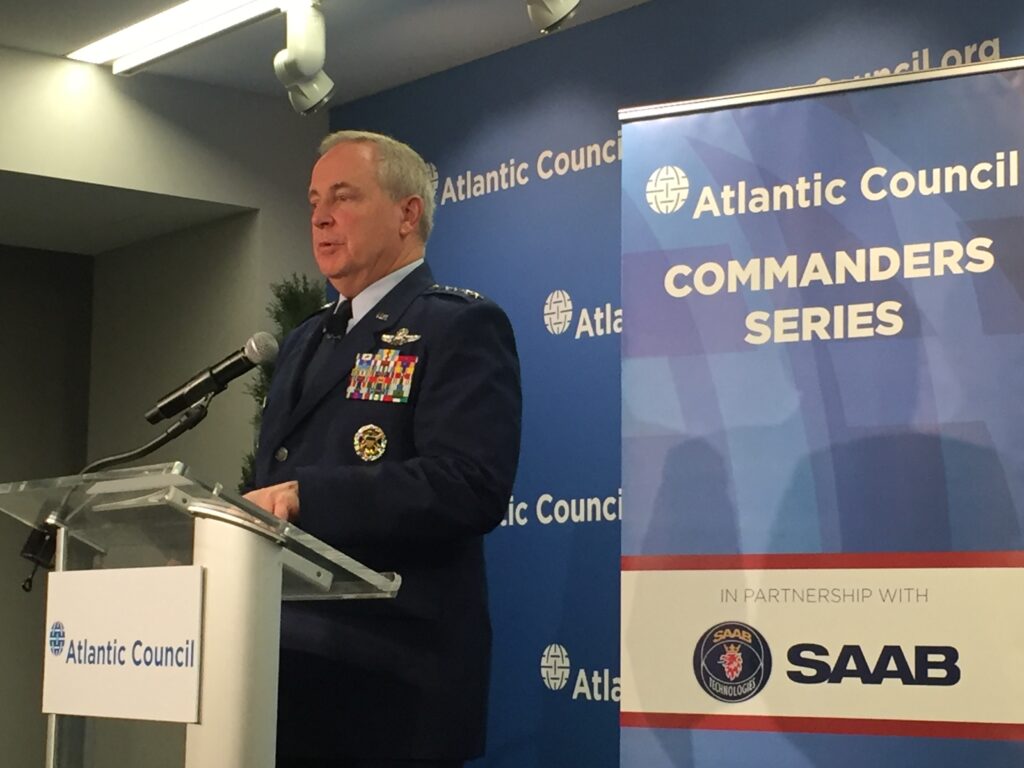WASHINGTON: Air Force Chief of Staff Gen. Mark Welsh made clear today that, while his service will make its arguments for modernization programs such as the JSTARS replacement, F-35 and Long Range Strike Bomber, the Defense Secretary and the combatant commanders will make the final decisions.
The military’s latest and highest profile program, the Long Range Strike Bomber, is already under pressure.
“One of the ways that we’ll accommodate this $15 billion or so cut is there’ll probably be some slowdowns in some modernizations programs,” Pentagon Comptroller Mike McCord said yesterday at the Center for Strategic and International Studies. The Long-Range Strike Bomber will be one of those because the program was already running late and couldn’t spend money as fast as originally projected.
“We don’t get to make all those decisions,” Welsh said during Q and A about protecting programs.
I asked Welsh about McCord’s comments and he declined to comment, saying he wasn’t aware of the comptroller’s statements.
But Welsh’s comments about the “need for dialogue” with Defense Secretary Ash Carter and the Combatant Commanders mark a stark departure from the old budget wars. In days of yore, a military service fought to the death to preserve its budget share and its most important capabilities. Service chiefs often publicly mocked their budget competitors and publicly ignored the Office of Secretary of Defense, the heavyweight in the room.
The Air Force boasted how precision strike would make the Army unnecessary. The Army bleated that no war could be won without “boots on the ground.” The Navy muttered about carriers and submarines, warily watching the other two. Once the decisions were made the services would then complain about OSD “taxes,” which referred to the Pentagon’s practice of slicing a small percentage from a service’s programs and moving it to other places or declaring it an “efficiency.”
Welsh clearly isn’t very enthusiastic about the challenges faced by his service. He called it “a very difficult environment.” Being very careful to avoid casting aspersions — no matter how well deserved they might be according to many rational people in America — Welsh said national “politics are entertaining some days.”
Add the current Defense Department budget situation — there’s a funding gap for the 2017 budget and the Air Force just added an $85 billion program to the mix — heightens the drama. “Theres a lot of debate right now inside the Air Force,” Welsh admitted. On top of that debate, there’s a much higher level set of decisions that must be made. “I think it’ll be much more than an Air Force decision. There’ll have to be some department prioritization done about what to keep and what to take away,” Welsh told the Atlantic Council audience. Those decisions should be made by Christmas.
The Air Force may well face increased difficult in defending its programs with the departure of the head of Air Force acquisition, Bill LaPlante, who was a vigorous proponent for service programs. “It has never been good when there isn’t someone there,” Welsh told reporters after speaking at the Atlantic Council. He noted that Rich Lombardi, principal deputy assistant secretary, will step in. But there’s a big but: “He’s a very capable guy, but he won’t have Senate confirmation.” And that makes a difference in what you’re allowed to say in public, how much heft you have in confronting others who might want to take your money and how much other people in your service pay obeisance to you.
The other interesting tidbit from today’s appearance was Welsh’s defense of the current mix of manned and unmanned aircraft in response to a question about buying more expendable aircraft.
“Your assumption that Remotely Piloted Aircraft (drones) are cheap is a bad assumption. The cost curve looks just like manned aircraft today and it will get worse if we’re not careful,” he said, adding the costs of maintenance and the large number of people required to fly and land drones. He noted the Air Force is buying a mix and should stick with that while we figure out how best to blend drones and manned aircraft and just what roles and what weapons mixes work best.
Navy jet trainer fleet operations remain paused after engine mishap
One week after the incident, a Navy spokesperson says the service is continuing to assess the fleet’s ability to safely resume flight.



























